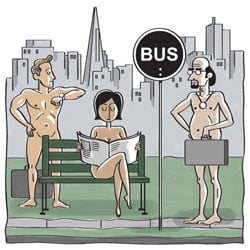Keep yer pants on: San Francisco bans public nudity

Illustration by Jeff Dionise
Chipping away at San Francisco’s free-spirited reputation, the city’s Board of Supervisors narrowly approved a ban on public nudity in November.
The ordinance was introduced by Supervisor Scott … ahem … Wiener, who represents the predominantly gay Castro District. His constituents had been complaining that public nudity was no longer random or infrequent but a regular occurrence on sidewalks, in parks and even on buses. Under the law, a first offense carries a maximum penalty of a $100 fine, but a third violation would be characterized as a misdemeanor punishable by up to $500 and a year in jail. The ordinance allows nudity at festivals and parades such as the annual gay pride parade and the legendary Bay to Breakers foot race, both of which attract nudists.
In a 6-5 vote, the legislation was opposed by the most progressive board members. They argued that, in addition to infringing on self-expression, the law would divert police attention away from more pressing matters and also bruise San Francisco’s reputation as a world-class mecca for the uninhibited.
The ban took effect on Feb. 1. Meanwhile, nudists vow to continue their fight to have it overturned. On Jan. 30 a federal court dismissed a challenge to the ban by several plaintiffs, including nudity activist Gypsy Taub, who hosts the TV show My Naked Truth.
Despite the uproar, professor Rory Little of the University of California’s Hastings College of the Law believes the measure will be upheld. “The Supreme Court has held that ordinances banning public nudity are constitutional,” he says.
San Francisco’s ordinance was carefully designed to follow precedent, Little adds, and is narrow enough to exempt nudity at festivals and parades. “You don’t want people confronted by offensive conduct without a chance to avoid it,” he explains. “You can avoid festivals and parades—events that actually further expression. So in a sense, this law is less restrictive than a complete ban.”
Courts also don’t like facial challenges, so they’re likely to see how the ordinance is applied before issuing a sweeping ruling. Chances are, breastfeeding women aren’t going to be hauled down to the Hall of Justice.
“It’s fun to make fun of San Francisco, but lots of cities have these ordinances,” Little notes, including nearby Berkeley and San Jose. “Only in San Francisco,” he adds, “would it be viewed as an incursion.”



